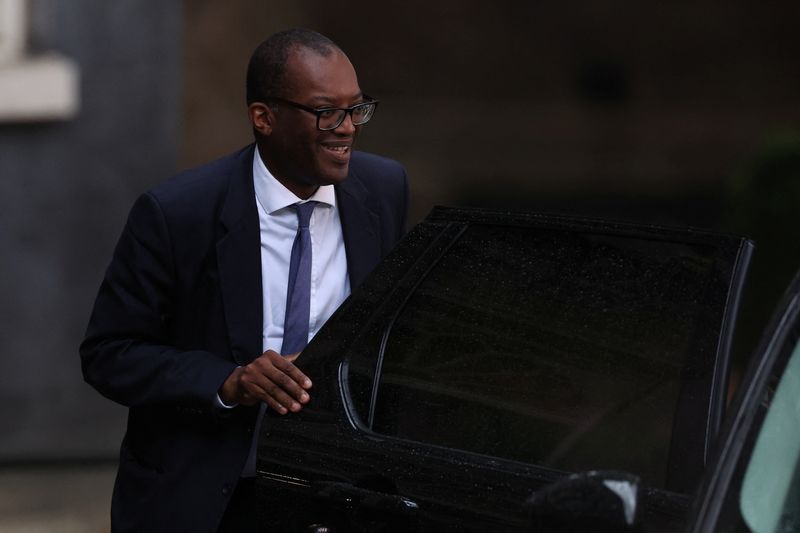By Alistair Smout, Elizabeth Piper and Sinead Cruise
LONDON (Reuters) - In Kwasi Kwarteng, Prime Minister Liz Truss has picked an ideological ally as Britain's new finance minister, charging him with tackling a cost-of-living crisis with a tax-cutting, big-spending plan that has worried markets.
The new Chancellor of the Exchequer, Kwarteng, 47, inherits an economy in crisis. It is forecast to go into a long recession later this year, with inflation at a 40-year high and limits on options for boosting growth.
Business and energy minister under outgoing premier Boris Johnson, Kwarteng backs his new boss's low tax, free market approach to the economy, a meeting of minds that could signal a cordial relationship at the heart of government.
That would contrast with the rift that developed between Johnson and his finance minister Rishi Sunak.
"Kwasi Kwarteng clearly has been a big part of Team Truss... So she's putting in someone who she thinks shares her sort of governing philosophy and priorities," said Jill Rutter, senior fellow at the Institute for Government think-tank and a former Treasury official.
"The energy and business background should stand him, in terms of understanding the real economy, in quite good stead... what he's not done is a big public services job or a big spending job."
Britain's first Black Chancellor, Kwarteng is the son of Ghanaian immigrants and scored a so-called "double-first" at Cambridge University in Classics and History, also attending Harvard University in the United States.
THATCHER ADMIRER
Kwarteng is an economic historian and, like many in the governing Conservative Party, says he admires Thatcher and the right-wing economic legacy she left, even writing a book about her.
But he has played down the extent to which her anti-statist ideals can be realised in the modern economy, saying reliving her approach today is "completely mistaken."
"The responses to that are not coming out of the 1980s textbook," he told the BBC in a podcast last year about his political ideology, giving the example of achieving net-zero emissions targets as an area where government involvement is key.
"You've got to adapt to the context in which you're living."
The context in 2022 - with skyrocketing inflation, higher interest rates and mounting industrial action - much more closely resembles conditions under Thatcher than when he spoke.
He has said that under Truss' leadership, the government will cut taxes and act to tackle the deepening cost of living crisis, and that there will need to be some fiscal loosening to help people through the winter.
An announcement is expected on Thursday, with a freeze on bills among the options Truss is considering.
Kwarteng's former role running the Department of Business, Energy and Industrial Strategy (BEIS) means he has met regularly with energy sector officials, and already put thought into what Britain's economy should look like in the medium term after leaving the European Union.
A committed Brexit supporter, Kwarteng has endeared himself to the right of the party, making a name for himself with his views in favour of lower taxes, a smaller state and deregulation in his book "Britannia Unchained," co-authored with Truss and other lawmakers.
However, in government he has been more pragmatic. Kwarteng stopped a review into working practice regulations when he became business minister last year, saying Brexit is not about "whittling away workers' rights, trying to have a race to the bottom or trying to reduce wages."
TOUGH ENOUGH?
He has also overseen the introduction of the National Security and Investment Act that has seen the government intervene in a couple of Chinese-backed takeover deals.
But he is increasingly frustrated by the reliance of British industries on government support, those who know him say.
Citing one example of this, one Westminster source said Kwarteng has been hostile to further requests for support from CF Industries (NYSE:CF), whose ammonia production makes the carbon dioxide in industries from pubs and to farming, angrily telling aides he would not give them another penny. CF Industries halted operations again last month.
"I wouldn't call him the most creative policymaker but he will listen to ideas and consider views," the Westminster source said.
Some of his Conservative colleagues question what he has tangibly achieved while at BEIS and his credentials for the finance ministry.
"Some say he's not tough enough to do the Chancellor job at a time when Britain needs someone who can push things through," one lawmaker said, while a veteran Conservative said the Treasury would "approve of his brain (but) disapprove of his independence."
Like Johnson, Kwarteng went to school at the prestigious and elite Eton College on a scholarship.
While at Cambridge he was a member of a winning team on popular TV quiz show University Challenge, and he has written several books including one on the history of the British Empire.

He has said that, although he experienced racist insults growing up in the eighties, he does not see himself as a symbol of anyone other than his constituents in Spelthorne, which borders London's south-west suburbs.
"I actually think that it's not that much of a big deal," he said after being appointed as the first Black Conservative front-bench minister. "I think once you've made the point, I don't think it's something that comes up that much."